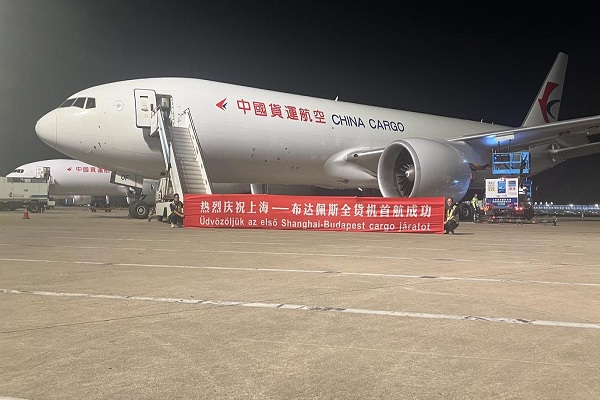Yangtze River Delta magnet to global firms
Great potential of Chinese market appealing to enterprises in many sectors such as chemicals, consumer goods, machinery
As more high-end manufacturing projects are launched by leading multinational corporations in Shanghai and surrounding areas, the business environment and industrial chain in the Yangtze River Delta region are proving attractive to foreign investment, which will help boost the country's industrial upgrading, said experts.
"The growing demand for high-quality nylon products in China and the Asia-Pacific region and the continued optimization of the business environment in Shanghai have given us the confidence to continue investment here," said Jeff Gentry, Invista chairman and CEO.
Invista, a United States-based producer of chemical intermediates, polymers and fiber, announced its largest capital investment ever by pouring more than $1 billion in June into the construction of a 400,000-metric-ton adiponitrile (ADN) facility in Shanghai Chemical Industry Park.
The facility is expected to begin production in 2022 and will introduce Invista's latest ADN technology to China to satisfy local demand.
"Once the ADN plant is completed, Shanghai will be home to the largest integrated nylon production facility in the world-from ADN to high-performance polymers," said Kyle Redinger, vice-president of Invista nylon intermediates Asia-Pacific.
The project has received support from government, partners and customers throughout the process, Redinger said.
"Local governments in the Yangtze River Delta region have been constantly improving the business environment in line with international conventions, including raising public services efficiency, enhancing enterprises experience, ensuring the transparency and fairness of market competition and protecting intellectual property," said Liu Mingyu, an associate professor at the school of management, Fudan University.
Experts suggested the flexibility and adaptability of urban management is also helping the region boost investors' confidence.
"I have lived in many different cities around the world, and from the corporate business perspective, what's impressed me most is the ubiquitous support and service from local governments. As planners, they have provided us with a great business environment," said Cui Xiaojun, CEO of KraussMaffei China.
Cui's parent company-Germany-based KraussMaffei-opened a new plant in Jiaxing, Zhejiang province, on June 18, about 100 kilometers southwest of Shanghai.
As a manufacturer of machinery and systems for production and processing of rubber and plastics, KraussMaffei plans to further enhance its local capabilities and provide customers with one-stop solutions. The new plant will double the company's production capacity in China, Cui said.
"Apart from a few core parts, we can find almost anything we need within the complete supply chain of the region," Cui said.
Major cities in the Yangtze River Delta region have established their own clear positions in the high quality development of specialty industries, and surrounding cities provide sufficient associated support industries, Liu said.
"In accordance with their respective comparative advantages, cities across the region have attracted various industries and formed integrated industrial chains at different levels. This is also applicable in attracting talent. No matter world-class experts, medium-level management talent or industrial workers-corporates can always find their target employees within the vast human resources in the Yangtze River Delta region," Liu added.
Cui said KraussMaffei can find all kinds of talent in the Yangtze River Delta region, whether it be high-quality factory workers or senior management staff.
Having its new plant located at the center of a world-class innovative industrial cluster in Zhejiang, KraussMaffei hopes to fully take advantage of the local supply chain and work with partners to facilitate industrial upgrading of China's intelligent manufacturing and rubber and plastics industries.
Johnson & Johnson recently delivered its first ultra high definition 4K endoscopic imaging system in Suzhou, Jiangsu province, about 100 km west of Shanghai.
This is not only the first 4K endoscopic imaging system in China's arthroscopy field, but also the first time the US-based company manufactured a product representing this technology in China.
"In the post-pandemic era, people will pay more attention to exercise and health, so their demand for high-quality healthcare solutions will also increase. The successful delivery (of the system) is a strong signal that Johnson& Johnson Medical Devices has pressed a fast-forward button for manufacturing high-end medical devices in China," said Song Weiqun, chairman of Johnson & Johnson China.
Liu of Fudan University said the great potential of the Chinese market is appealing to enterprises in many sectors such as chemicals, consumer goods and machinery.
"When we talk about the scale of the Chinese market, we are not only talking about the country's consumption capability as an end market, but also the nation as the world's factory for all kinds of products to supply the world," Liu said.
"Emerging new technologies and trends, intelligent manufacturing as well as digital services and solutions will bring new opportunities to our industry," Cui said, adding that the more than 180-year-old KraussMaffei is looking to expand in the Chinese market, increase localization capabilities and create value for customers in China and the rest of the world.
From importing, producing and manufacturing advanced products, Johnson & Johnson is committed to cultivating an open innovation ecosystem, said Song. By supporting the development of a healthy China through intelligent manufacturing, Johnson & Johnson is committed to the long-term promotion of the concept of "Made in China, for China" and supports China's efforts to upgrade to high-end intelligent manufacturing.
Zuo Xuejin, a researcher from the Shanghai Academy of Social Sciences, called the foreign projects win-win situations.
"While multinational corporations are cashing in on the Chinese market, their investment is helpful for the sustainability of the industrial chain and technological innovation in China," Zuo said.

